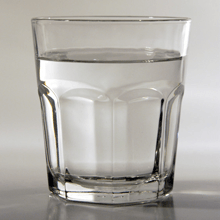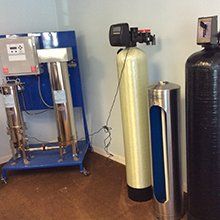
Top-quality solutions for your water problems
Do you know there are a variety of factors that can affect how your water tastes, smells, and feels? Rely on Altoona Soft Water for safe and excellent water solution services. Our services are available for residential and commercial sites.
Are you facing a water problem? Read more about common water problems in PA. If you want to schedule a
FREE water analysis today, call us at 814-943-2768.
Get in touch with us for great water services.

Hard water
Hard water contains dissolved calcium, magnesium and iron. Most homes in the area have hard water, regardless of whether it has been supplied by the municipality or a private well. More often than not, homeowners don't realize that they have been supplied hard water or the harm that it can cause.

Iron and manganese staining
Depending on where you live, water can contain varying proportions of iron or manganese. This can cause a rusty-orange or black stain and can often be seen on clothes, fixtures, sinks, tubs, water-using appliances and toilets.
Blue-green staining
Chlorine has been used as a disinfectant to get rid of harmful bacteria in water and the pipes that transport it. Chlorine has been used as a disinfectant since the 1850s. Though it has helped end a number of threats to public health and is imperative to treat water and distribution of it, it is no longer required once the water reaches your home.
The benefits of chlorine come at a price. Chlorine smells and tastes bad. It is known to cause dry skin and often fades clothes. Bleach is made of chlorine and can dry out the rubber seals in appliances, shortening their lives.
Chlorine taste and smell
Cloudy water is often caused by dissolved or suspended solids. Also known as "turbidity", water can become "turbid" naturally or from land disturbances such as construction, storms and urban runoff. The turbidity of your water can range from low to high. Sometimes, even if your water looks clear, it's probably not. It can still contain high levels of dissolved solids. This is why, whether your water is turbid or not, we recommend you get it tested.
Cloudy water
According to the Centers for Disease Control and Prevention, there could be as many as 12 million cases of waterborne acute gastrointestinal illness cases every year in the US alone. Most often, these are caused by bacteria, viruses and protozoa that are found in our water. Even the most high-end, state-of-the-art treatment plants cannot ensure that drinking water is entirely free of microbial pathogens.
Bacteria and viruses
In its normal state, water is colorless, odorless and tasteless. So if your water tastes or smells funny, here are some of the reasons why:
Earthy or musty taste and odor: This is generally because of compounds released due to decayed vegetation and is typically associated with various forms of algae. Though they are not toxic, they definitely come with an unpleasant odor and can be offensive at very low concentrations.
"Rotten egg" smell: Another common type of odor experienced is the "rotten egg" smell. This is due to the presence of hydrogen sulfide in the water. Hydrogen sulfide is a colorless corrosive gas which emits an odor similar to that of rotten eggs if present in high enough concentrations. It is also known to leave an unpleasant odor on hair and clothing and can accelerate corrosion of metal.
Metallic taste: As the name suggests, a metallic taste to your water indicates the presence of metals such as iron, copper, manganese or zinc. Iron and manganese are naturally occurring in groundwater. Copper and zinc, however, can come from an aging water distribution system or corrosion of the pipes through which it travels.
